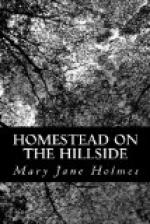“Who is to be the bride?” asked Hugh.
“Ada Linwood. Now I know you’ll come, won’t you?”
“I’ll see,” was Hugh’s answer, as he walked away.
Jenny well knew that “I’ll see” meant “yes,” and tying on her bonnet, she hastened off to tell Ada that Uncle Hugh would be present, and would act the part of bridegroom in the scene where she was to be bride.
“What! that big man?” said Ada. “How funny!”
Before seven the next evening Mrs. Durant’s parlors were filled, for the guests were not old enough or fashionable enough to delay making their appearance until morning. Hugh was the last to arrive, for which Jenny scolded him soundly, saying they were all ready for tableaus. “But come, now,” said she, “and let me introduce you to the bride.”
In ten minutes more the curtain rose, and Hugh St. Leon appeared with Ada on his arm, standing before a gentleman in clerical robes, who seemed performing the marriage ceremony. Placing a ring on Ada’s third finger, St. Leon, when the whole was finished, took advantage of his new relationship, and kissed the lips of the bride. Amid a storm of applause the curtain dropped, and as he led the blushing Ada away he bent down, and pointing to the ring, whispered, “Wear it until some future day, when, by replacing it, I shall make you really my little wife.”
The words were few and lightly spoken, but they touched the heart of the young Ada, awakening within her thoughts and feelings of which she never before had dreamed. Frequently, after that, she met St. Leon, who sometimes teased her about being his wife; but when he saw how painfully embarrassed she seemed on such occasions, he desisted.
The next year he was graduated, and the same day on which he received the highest honors of his class was long remembered with heartfelt sorrow, for ere the city clocks tolled the hour of midnight he stood with his orphaned niece, Jenny, weeping over the inanimate form of his sister, Mrs. Durant, who had died suddenly in a fit of apoplexy. Mr. Durant had been dead some years, and as Jenny had now no relatives in New Haven, she accompanied her uncle to his Southern home. Long and passionately she wept on Ada’s bosom as she bade her farewell, promising never to forget her, but to write her three pages of foolscap every week. To do Jenny justice, we must say that this promise was faithfully kept for a whole month, and then, with thousands of its sisterhood, it disappeared into the vale of broken promises and resolutions.
She still wrote occasionally, and at the end of each epistle there was always a long postscript from Hugh, which Ada prized almost as much as she did Jenny’s whole letter; and when at last matters changed, the letter becoming Hugh’s and the postscript Jenny’s, she made no objection, even if she felt any. At the time of her father’s failure and death, a long unanswered letter was lying in her portfolio, which was entirely forgotten until weeks after, when,




